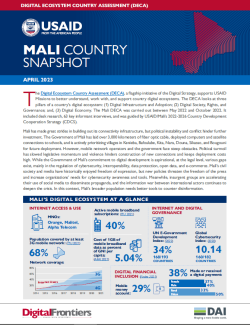The Digital Ecosystem Country Assessment (DECA), a flagship initiative of the Digital Strategy, supports USAID Missions to better understand, work with, and support country digital ecosystems. The DECA looks at three pillars of a country’s digital ecosystem: (1) Digital Infrastructure and Adoption; (2) Digital Society, Rights, and Governance; and, (3) Digital Economy. The Mali DECA was carried out between May 2022 and October 2022. It included desk research, 63 key informant interviews, and was guided by USAID/Mali’s 2022-2026 Country Development Cooperation Strategy (CDCS).
Mali has made great strides in building out its connectivity infrastructure, but political instability and conflict hinder further investment. The Government of Mali has laid over 3,000 kilometers of fiber optic cable, deployed computers and satellite connections to schools, and is actively prioritizing villages in Kenieba, Bafoulabe, Kita, Nara, Douna, Sikasso, and Bougouni for future deployment. However, mobile network operators and the government face steep obstacles. Political turmoil has slowed legislative momentum and violence hinders construction of new connections and keeps deployment costs high. While the Government of Mali’s commitment to digital development is aspirational, at the legal level, various gaps exist, mainly in the regulation of cybersecurity, interoperability, data protection, open data, and e-commerce. Mali’s civil society and media have historically enjoyed freedom of expression, but new policies threaten the freedom of the press and increase organizations’ needs for cybersecurity awareness and tools. Meanwhile, insurgent groups are accelerating their use of social media to disseminate propaganda, and the information war between international actors continues to deepen the crisis. In this context, Mali’s broader population needs better tools to counter disinformation.
Read the full Mali Digital Ecosystem Country Assessment (English).
Read the Mali DECA (French).
Read the Mali DECA Country Snapshot (French).

